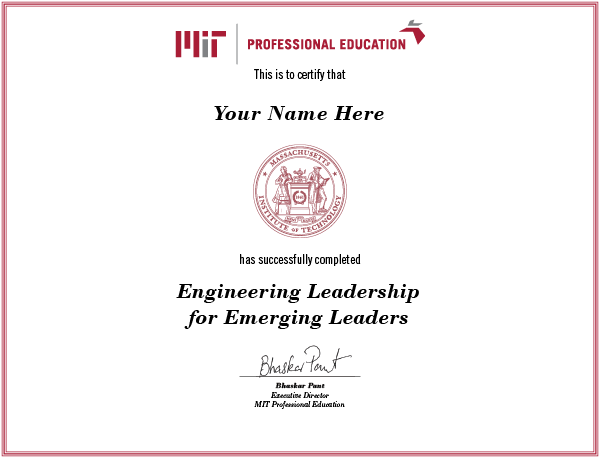Program Outline
Day One — Fundamentals of Leadership for Engineering Professionals
9:00 AM – 9:30 AM: Introduction to program instructors, participants, and learning goals.
9:30 AM – 11:00 AM: Fundamentals of engineering leadership: Overview of perspectives on management and leadership and implications for emerging leaders.
11:00 AM – 11:15 AM: Break
11:15 AM – 12:00 AM: Fundamentals of engineering leadership (cont).
12:00 AM – 1:00 PM: Lunch
1:00 PM – 2:30 PM: Where leadership skills matter in technical career paths.
2:30 PM - 2:45 PM: Break
2:45 PM – 4:15 PM: Creating a team vision: Review methods for creating a shared team vision and overview of practice exercise.
4:15 PM - 4:30 PM: Break
4:30 PM – 4:45 PM: Introduce group project: Discuss how program participants will form groups to address topics of special interest
4:45 PM – 5:30 PM: Learning from reflection: Participants review, assess, and document day's key learning.
Day Two– Leading in Multi-Stakeholder and Systems Engineering Environments
9:00 AM – 10:15 AM: Achieving collective support in multi-stakeholder environments: Discerning and prioritizing diverse stakeholder needs; Reconciling differences and presenting a unifying vision; Achieving buy-in and support for complex projects and programs.
10:15 AM – 10:30 AM: Break
10:30 AM – 12:00 AM: Achieving collective support in multi-stakeholder environments.
12:00 AM – 1:00 PM: Lunch
1:00 PM – 2:30 PM: Leading the development of complex systems.
2:30 PM – 2:45 PM: Break
2:45 PM – 3:15 PM: Reflection: Participants review, assess, and document day's key learning.
3:15 PM – 5:30 PM: Form special interest groups and begin working on group projects.
Day Three — Building Positive Relationships and High Performing Teams
9:00 AM – 10:15 AM: Making an Impact: Setting yourself up for successful career progression.
10:15 AM – 10:30 AM: Break
10:30 AM – 12:00 PM: How leaders create motivating environments in teams.
12:00 AM – 12:10 AM: Break
12:10 AM - 1:10 PM Lunch
1:10 AM – 1:20 AM: Break
1:20 PM – 2:00 PM: Developing high performing teams: Challenges and strategies.
2:00 PM – 3:00 PM: Experiential learning exercise
3:00 PM – 3:15 PM: BREAK
3:15 PM – 3:45 PM: Reflection: Participants review, assess, and document day's key learning.
3:45 PM – 5:30 PM: Groups work on projects and final presentations.
Day Four— Managing Oneself, Building an Inclusive Environment, and Negotiations
9:00 AM – 10:15 AM: Leadership operating framework. An interactive discussion on leadership, and the
skills, characteristics, behaviors, and attitudes forming a framework for effective leaders.
10:15 AM – 10:30 AM: Break
10:30 AM – 12:00 PM: Leading an inclusive engineering environment: Strategies for developing inclusive and creative cultures in engineering teams.
12:00 PM – 1:00 PM: Lunch
1:00 PM – 3:15 PM: Managing conflict and negotiations: Evaluating your personal conflict management styles and practice negotiation skills.
3:15 PM – 3:30 PM: Break
3:30 PM – 4:00 PM: Reflection: Participants review, assess, and document day's key learning.
4:00 PM – 5:30 PM: Groups work on projects and final presentations.
Day Five — Final Presentations
9:00 AM – 10:15 AM: Special topics presentations: Groups will deliver their final presentations on engineering leadership topics of special interest.
10:15 AM – 10:30 AM: Break
10:30 AM – 11:45 PM: Special topics presentations (cont.)
11:45 AM – 12:15 PM: Charting your leadership development journey
12:15 PM – 1:00 PM: Course reflection: Participants reflect on week's activities, assess program.
Adjourn



